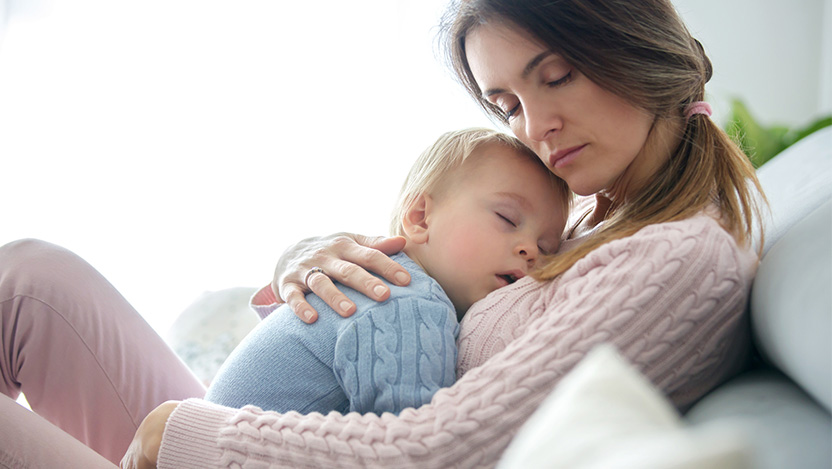Respiratory Syncytial Virus (RSV) in Children

What is RSV?
Respiratory syncytial virus (RSV) is a common virus that can cause infections in the nose, throat, lungs and respiratory tract. Almost all children are infected with RSV by age 2, and re-infections are common at all ages.
RSV is a leading cause of hospitalization in infants. Cases of RSV are prevelant throughout the country. If your child needs emergency care, it may be helpful to contact your child’s pediatrician
What Parents and Caregivers Need to Know About RSV
Common symptoms for RSV include:
- Runny nose
- Decreased appetite
- Coughing and wheezing
- Sneezing
- Fever
Most people will only experience mild symptoms and recover after one to two weeks. However, symptoms can be more severe for high-risk individuals, including:
- Very young children
- Older adults
- Anyone with chronic health problems
For premature babies, infants 6 months or younger and children with weakened immune symptoms, RSV infection can lead to severe illness including bronchiolitis and pneumonia.
Symptoms of RSV in infants, younger than 6 months old, may include:
- A lack of hunger and activity
- Irritability
- Breathing problems
RSV symptoms can be very similar to other contagious respiratory viruses. An RSV infection can often look very similar to a common cold, in particular. RSV infection can come in stages, so be on the lookout if symptoms worsen. This is a sign that you should contact a health care provider.
The virus is highly contagious and can spread in a variety of ways, including:
- Droplets from a sneeze or cough of an infected person coming into contact with your eyes, nose or mouth
- Touching a surface (like a counter) that is contaminated with the virus
- Making direct contact with the virus (such as kissing a loved one who has RSV)
Thankfully, there are very important measures you can take to minimize the spread of RSV.
In addition to the vaccines and injections mentioned above, you can avoid spreading RSV if you:
- Practice proper hand hygiene and wash your hands regularly.
- Stay home when you have symptoms and avoid close contact with others if either of you are infected.
- Cover your coughs and sneezes and dispose of used tissues right away.
- Disinfect hard surfaces that are used often, especially if they have been touched by someone who's feeling sick.
- Avoid touching your face.
Similar to many other respiratory viruses, there is no specific treatment for managing the symptoms of an RSV infection. Over-the-counter (OTC) fever and pain medication may be suitable for mild symptoms, but make sure to confirm that the product is safe for kids before giving it your child. Your child’s doctor can help identify safe medications and dosage. It is also important to drink plenty of fluids to avoid dehydration.
If symptoms start to worsen, your child’s healthcare provider can discuss the appropriate treatment. Children, especially young infants, may need to be hospitalized while they receive oxygen support and/or intravenous fluids to stay hydrated.
Symptoms of RSV usually go away after one to two weeks. Researchers are currently working on new medications and vaccines to aid in the fight against the virus.
SYNAGIS is a humanized monoclonal antibody that can help prevent hospitalization for children who are at high risk for severe RSV symptoms.
These monthly injections provide key antibodies that fight infection for at-risk groups, such as former premature infants and babies with certain lung and heart conditions.
Infants who qualify for SYNAGIS also qualify for the new preventative treatment nirsevimab. Infants at risk for severe RSV diseases who qualify for SYNAGIS this year and have gotten a dose can safely get nirsevimab and do not need any more doses off Synagis after that.
Contact your child’s physician if you would like to learn more about SYNAGIS or nirsevimab.
If you or your child are experiencing any RSV or cold-like symptoms:
- Stay home from school or call in sick from work until you recover.
- Social distance and avoid close contact with others.
- Place extra emphasis on all of the prevention tips above.
- Contact a healthcare provider if symptoms worsen.
You should contact your child’s doctor immediately if you see any signs of the following severe symptoms:
- Wheezing, rapid breathing, nostril flaring or the head bobbing while breathing (These may be signs of bronchiolitis.)
- Difficulty breathing
- A major decline in activity
- Dehydration
- Lips, skin or tongue turning blue or gray
“Even if you are unable to get an RSV vaccine, you can do your part by staying up-to-date on your flu and COVID vaccines. This can play a major role in reducing hospitalizations and enabling our teams to provide the best care possible during virus season.”
Allison Bartlett, MD, MS
Associate Medical Director, Infection Control Program Pediatric

